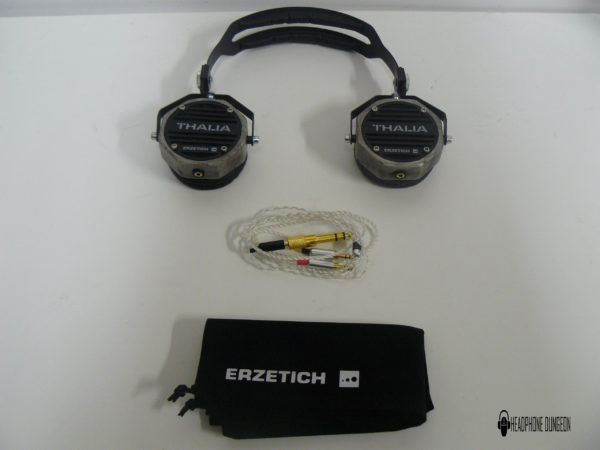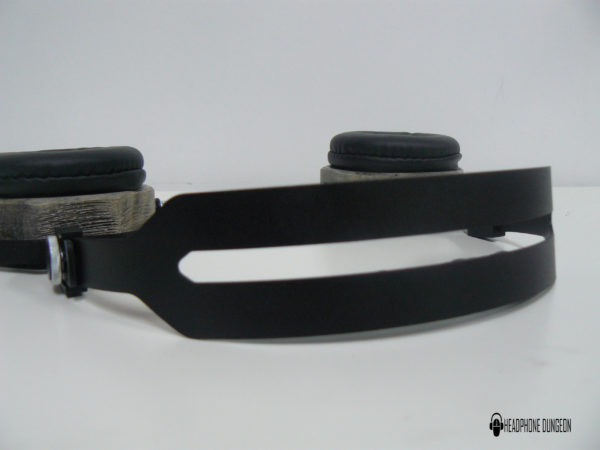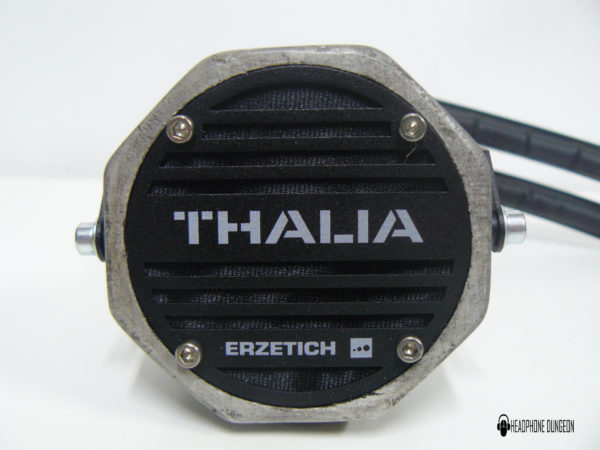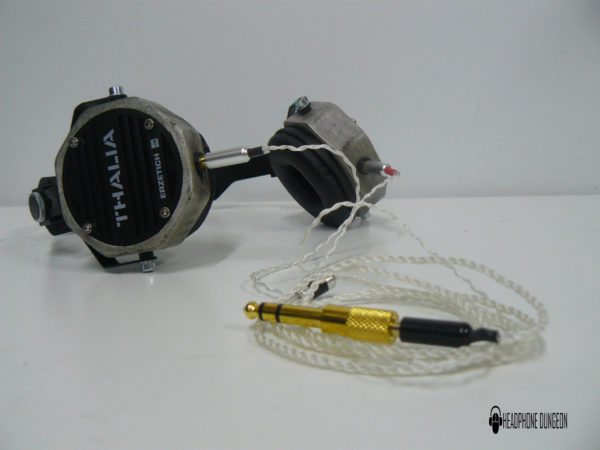You don’t see many flat cup open-back headphones unless the name Grado is attached to them. Their popularity speaks for itself, but they’re not the only manufacturer brandishing flat open-backs. Erzetich might not be a name currently on your radar, but around 2019 they released the Thalia, advertised a portable dynamic headphone. Open-back and portability are rarely put together due to the nature of their sound leakage, but there is still a use for them in some environments. I was able to try out the Thalia and give my thoughts. These headphones currently go for the price of $660, which places them among some strong competition. Can the Thalia stick out among them?

What You Get
Erzetich keeps the packaging light, providing you only the bare essentials. In the box, you get the headphones, a leather drawstring pouch, and the Thalia’s 3.5mm detachable headphone cable. A quarter-inch adapter will be already attached to the headphone jack.

Look and Feel
With a pair of flat cup headphones, you never know exactly how small the earcup is going to be. Looking at the Thalia for the first time, they’re noticeably smaller headphones than you would normally see at this price range. The octagonal shape of the cup is unique, especially with the wood housing it’s made from. In fact, a lot of the materials used for the build make for a sturdy pair of headphones. It uses a metal framework for the headband, ensuring a sufficient level of durability, and the soft leather pad underneath reduces some of its pressure. However, the same can’t be said about the earpads.
When I first put on the Thalia, I thought the cups clamped down a little too much. It has a pinch that reduces the comfortability of the Thalia, but after a while of listening, it’s just a feeling you get used to. My favorite aspect of this headphone is the wooden housing, which isn’t like many other wooden headphones. Instead of a polished resin, the wood is presented as rough and natural, with even a few cracks. I found it aesthetically pleasing, especially with the Salvage variation I received.

Design
The Thalia supports a 40mm dynamic titanium unit for its driver system. Although it’s an open-back principle, the leakage isn’t as big of an issue as some other models. Some a few feet away would only be able to faintly hear what you’re listening to if you were to make this your travel headphone.

Output
While the Thalia only runs with 32 Ohms of Impedance, Erzetich suggests using an amp with portable devices. It’s unusual to say for a dynamic headphone with this resistance, but when I tried it out I heard what they meant. Using my standard lightning dongle for my iPhone just didn’t provide the level of volume needed to put the Thalia at a comfortable gain. Using my PC headphone jack served a lot better, but if you need the Thalia for headphones on the go, I would suggest a small DAC/Amp adapter. Something like the ALO Pilot or the Periodic Audio Rhodium worked great. Both amps supplied the Thalia with a sufficient signal flow, offering plenty of room for gain adjustment.
Soundstage
I love a good open-back soundstage and at this price range, it’s gonna be tough for the Thalia to stand out. Thankfully, the Thalia showcases some great depth and has a nice sense of spatial imaging. However, it doesn’t feel like it fully grows into anything super immersive due to the more narrow sound field. The Thalia still features a semi-holographic stereo image and is even quite airy. None of the sound elements feel like they are solidified to a certain position. Instead, they float around in an unrestrictive sound field, making for a more playful soundstage. The level of separation also gives the sounds a stronger definition, layering the sections over each other with good balance. It’s an open-back headphone where you can properly hear the distance some instruments and effects are supposed to have, even if the way they’re expressed isn’t done with much grace.
Low End
If you’re hoping for a solid bass response for an open-back headphone, the Thalia has you covered. The Thalia has a detailed timbre with some great impact that feels like it’s bursting with energy. Clean textures appear throughout the lows and help give it that much more articulation. It mostly plays a balancing act, relegating the lows to a tighter space.
Mids
Compared to the accentuated lows, the mids come off as a bit too relaxed. There’s some clarity here, but some of the fundamental frequencies tend to fall into recession. The instrumentations still showcase some nice resolution, but with a little more meat on the bone, it could have been so much better. That’s not to say the mids don’t have anything to offer though. If face, one of the Thalia’s highlights is how well vocals come across. They appear full and well-realized, coming off with a good amount of push and clarity.
Highs
When the highs are bright but exhibit a strong character and sense of texture, it becomes one of my soft spots. The Thalia is bright but avoids harshness, and only becomes a little intimidating with some slight peakiness. For me, the highs made the sound signature that much more digestible. I engaged more with the timbre when it’s not afraid to show the highs for what they are instead of rolling them off. Especially when you have an open-back headphone, the treble should do a good job adding that extra air and height. The Thalia is mostly successful with this, bringing a playful treble that offers more than it takes away.
Summary
At $660 it’s hard to say whether the Thalia is going to win you over. In terms of sound, it offers what most open-back headphones should, a good soundstage with airy characteristics. However, the performance of these elements is only a bit above average. If this headphone was much less, then I could see myself recommending it to those who are might be looking for their first open-back, but at this price, there’s just way too much competition.
Pros and Cons
Pros: Deep soundstage, Meaty bass, textured highs
Cons: Slight pinch, Too much competition
You can find the Erzetich Thalia available here.
Headphonedungeon may get a commission from retail offers.

